While international media organizations debate theoretical frameworks for information integrity, Ukrainian journalists working meters from active combat zones are pioneering practical solutions that could reshape global media training standards.
The National Union of Journalists of Ukraine (NUJU) is implementing “Strengthening the Resilience of Frontline Media as a Tool for Combating Disinformation”—a comprehensive program training border and frontline reporters to develop rapid-response verification systems while operating under artillery fire, power outages, and constant cyber attacks. The initiative, funded by Lithuania’s embassy, represents an unprecedented direct investment in conflict-zone journalism education.
“Our verification skills are reaching a new level,” reports Tetiana Kaushan, editor of Putyvlski Vedomosti in the Sumy region, whose newsroom has become a testing ground for innovative approaches that combine artificial intelligence tools with traditional shoe-leather reporting techniques developed specifically for conflict zones.
The initiative, supported by Lithuania’s embassy, represents a fundamental shift from defensive information strategies to proactive media resilience building. Unlike conventional media literacy programs, NUJU’s training directly engages journalists who are simultaneously covering humanitarian tragedies, debunking propaganda in real-time, and maintaining community trust—often while their own offices face destruction.
The program’s methodology combines digital verification tools, media psychology training, and conflict storytelling techniques. In just two months—from mid-July through mid-September 2025—participants completed six mentoring sessions and produced approximately three dozen publications applying their new skills.
“Local media are rarely mentioned in discussions about information integrity,” notes war correspondent Yulia Surkova, one of the program’s mentors. “Yet their courage and dedication to professional standards under impossible circumstances is creating new benchmarks for crisis journalism worldwide.”
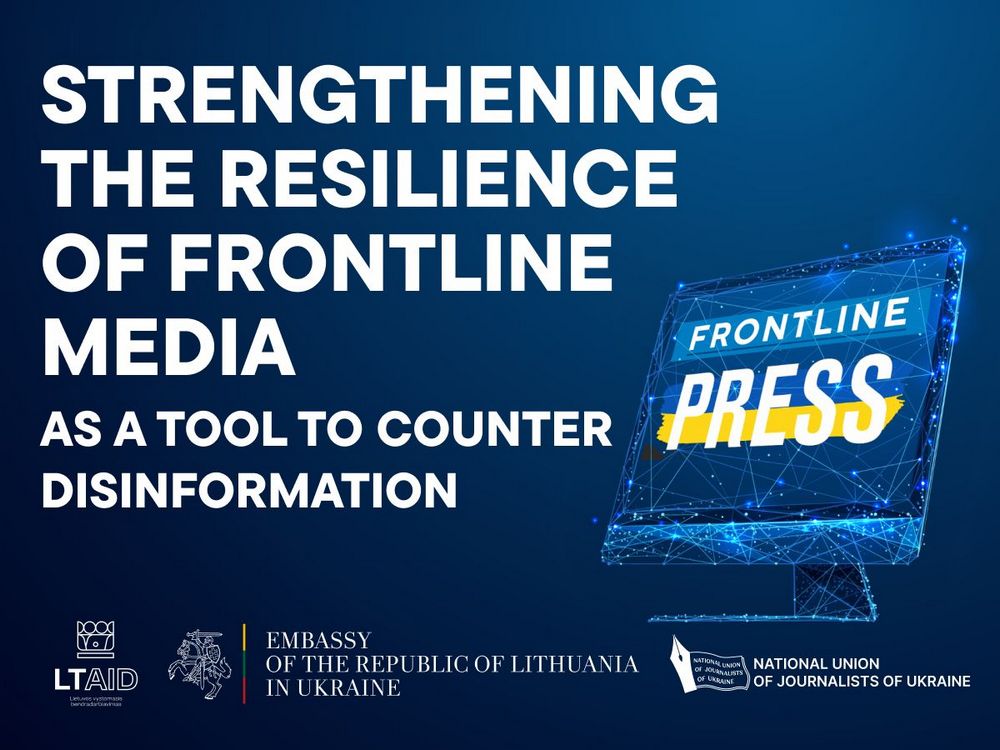
Real-Time Verification Under Fire: How Border Journalists Combat Information Warfare
The September 4 Russian strike on Danish Refugee Council humanitarian deminers near Chernihiv illustrates the rapid-fire nature of modern information warfare. Within hours of the attack that killed two civilian workers, Russian sources circulated video claiming they had targeted a “drone launch center.”
For Olha Makukha, editor of the Chernihiv-based newspaper Vist, the false narrative demanded immediate response. Her publication featured testimony from Valeriya, daughter of deceased deminer Serhii Molyboha, who systematically dismantled the propaganda claim.
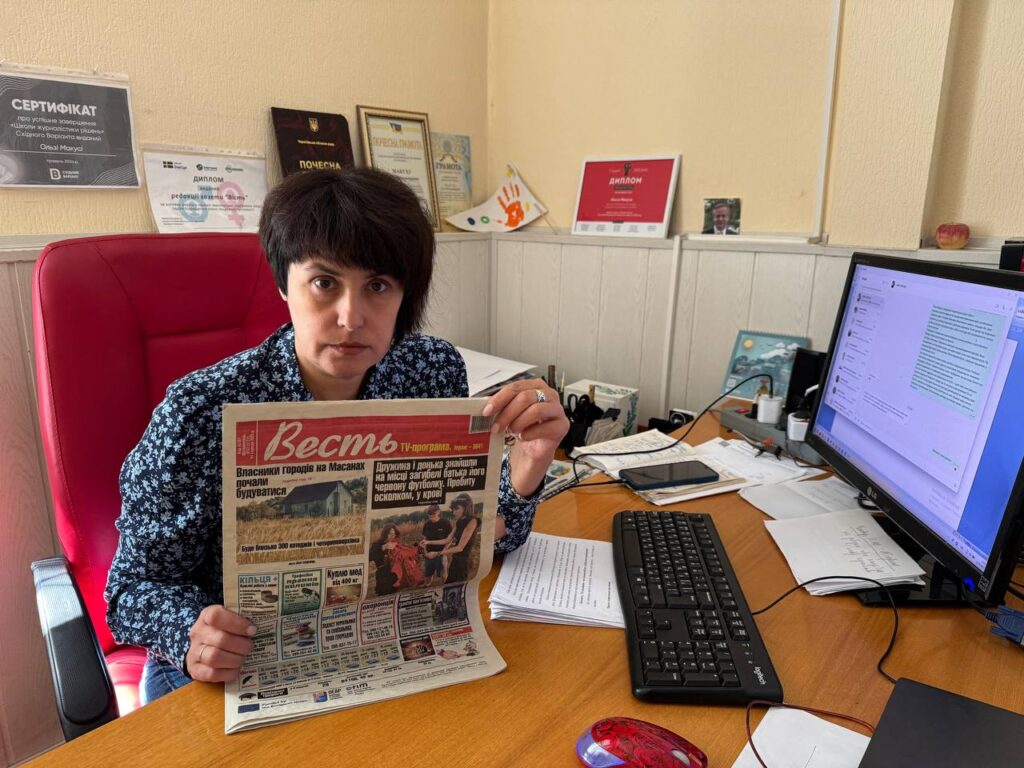
“If you look closely at that video, you can see eight minibuses and civilian workers, not a military facility,” Valeriya told Vist readers. “Dad’s car was under the target.”
This kind of rapid, source-based debunking represents exactly what NUJU’s training program aims to systematize. “During the training, we received clearer guidelines on how local media can counteract disinformation,” Makukha explains. “We’re now actively applying verification tools for photo and video content in practice.”
The challenge facing frontline newsrooms extends beyond individual fact-checks. Tetiana Lohvina, editor of Visti Zmiyivshchyny in Kharkiv region, notes that even sophisticated readers can be overwhelmed by information volume. “When everyone deals with huge amounts of information from various sources, even the most advanced people can get lost and perceive false information as reality,” she observes.
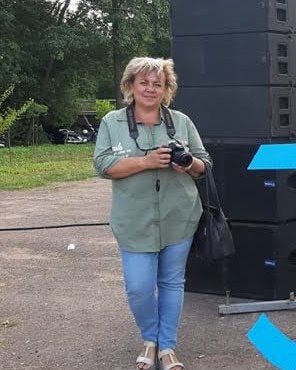
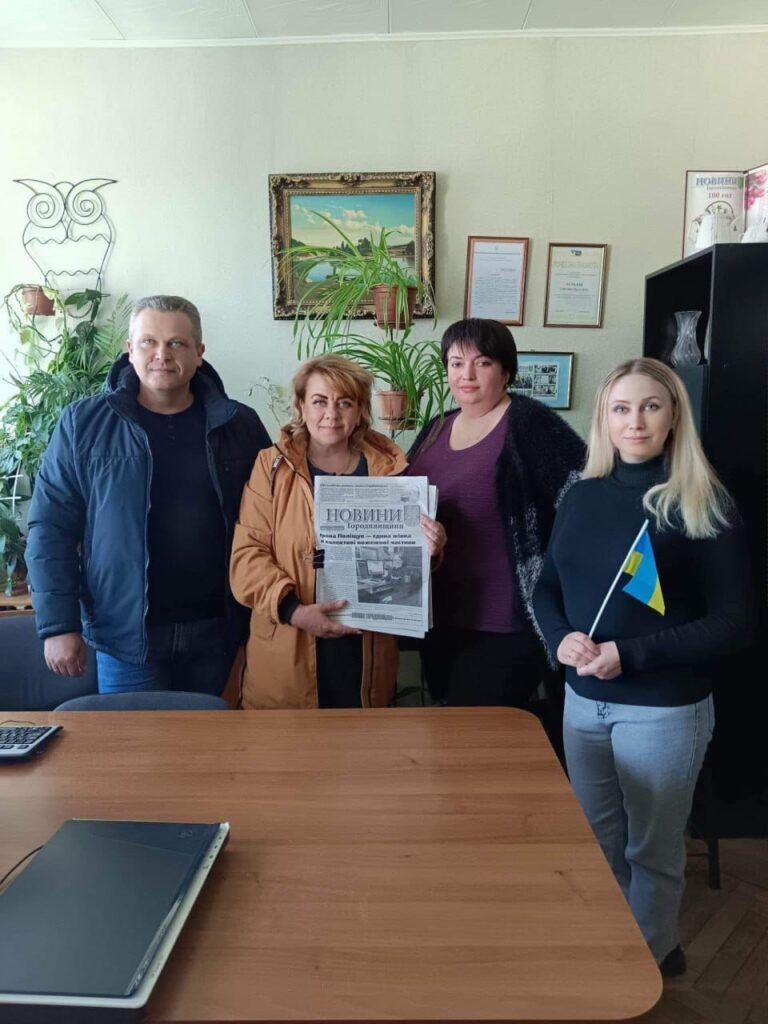
Strategic Response vs. Tactical Verification
Program mentor Tetiana Ivanova, professor and media literacy expert at Mariupol State University, identifies a critical gap in traditional journalism training: strategic assessment of information threats.
“Course participants understand false information as a problem and recognize the importance of counter-responses,” Ivanova explains. “However, they cannot always distinguish which false narratives require response and which do not. They lack criteria for assessing the danger level of specific disinformation campaigns.”
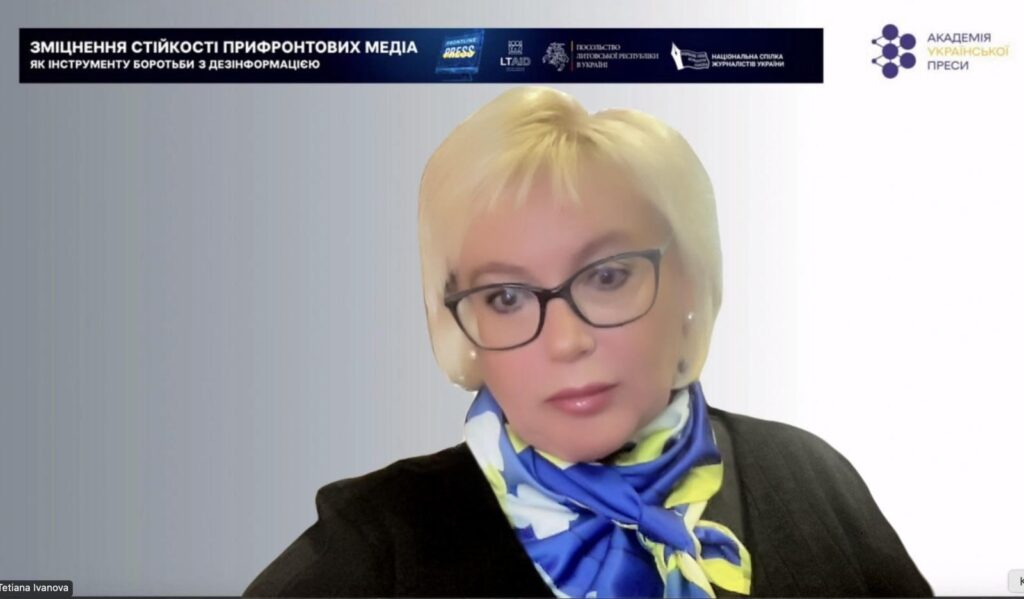
This strategic thinking goes beyond technical verification skills. “Journalists must understand not only verification techniques and refutation methods, but also how false information is created and the psychology behind its impact on audiences,” Ivanova continues. “This falls into the realm of manipulation psychology—an area of critical importance for media professionals serving as guardians of the information landscape.”
Svitlana Tomash, editor of Chernihiv’s Visti Horodnianshchyny, credits Ivanova’s mentoring with transforming her newsroom’s approach: “We can now freely navigate the information space. It’s become much easier to distinguish enemy propaganda materials and organize professional counteraction.”
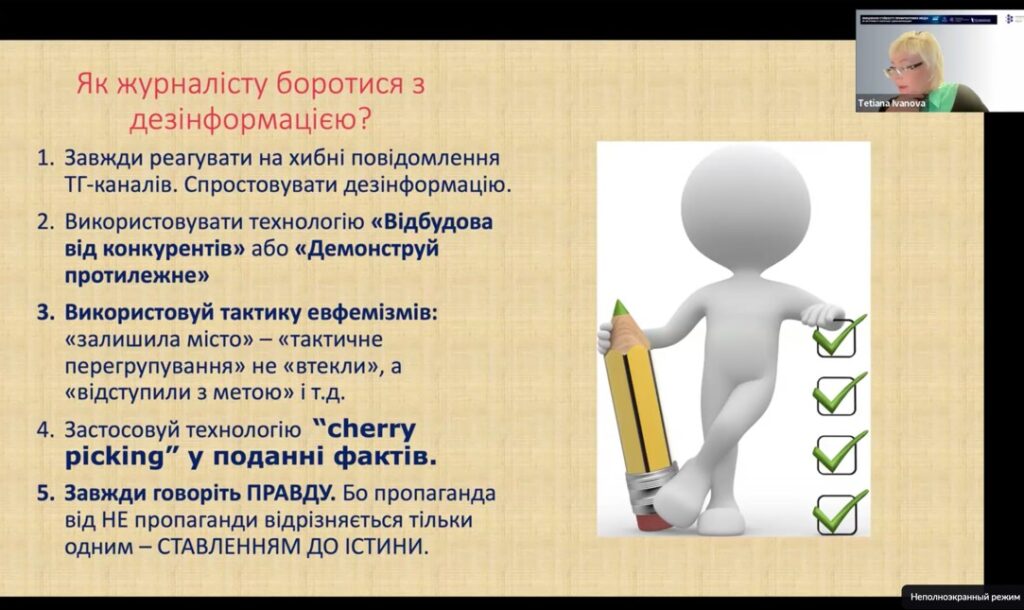
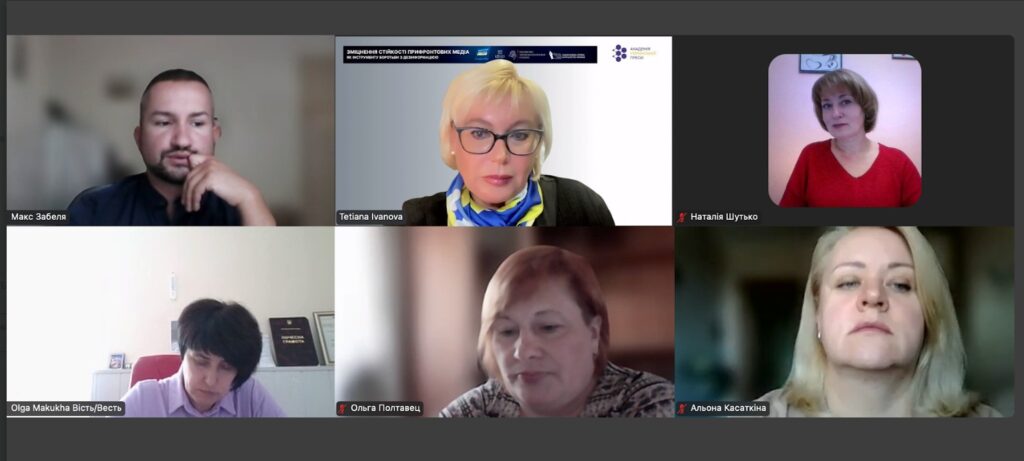
Ground-Level Implementation
The program’s practical impact is most visible in frontline regions where verification happens under extreme conditions. Tetiana Kaushan, editor of Putyvlski Vedomosti in Sumy region, describes the frontline reality: “Border journalists are the first to encounter distorted information. We often have to deny something, explain it to readers immediately.”
Her regional colleague Olena Kasatkina of Panorama newspaper emphasizes the trust advantage local media maintain: “People in these communities trust local media more often. We can counteract false news on the spot, even before it gains momentum.”
For these editors, the NUJU training represents more than skills development—it’s operational capacity building for information warfare conditions that show no signs of abating.
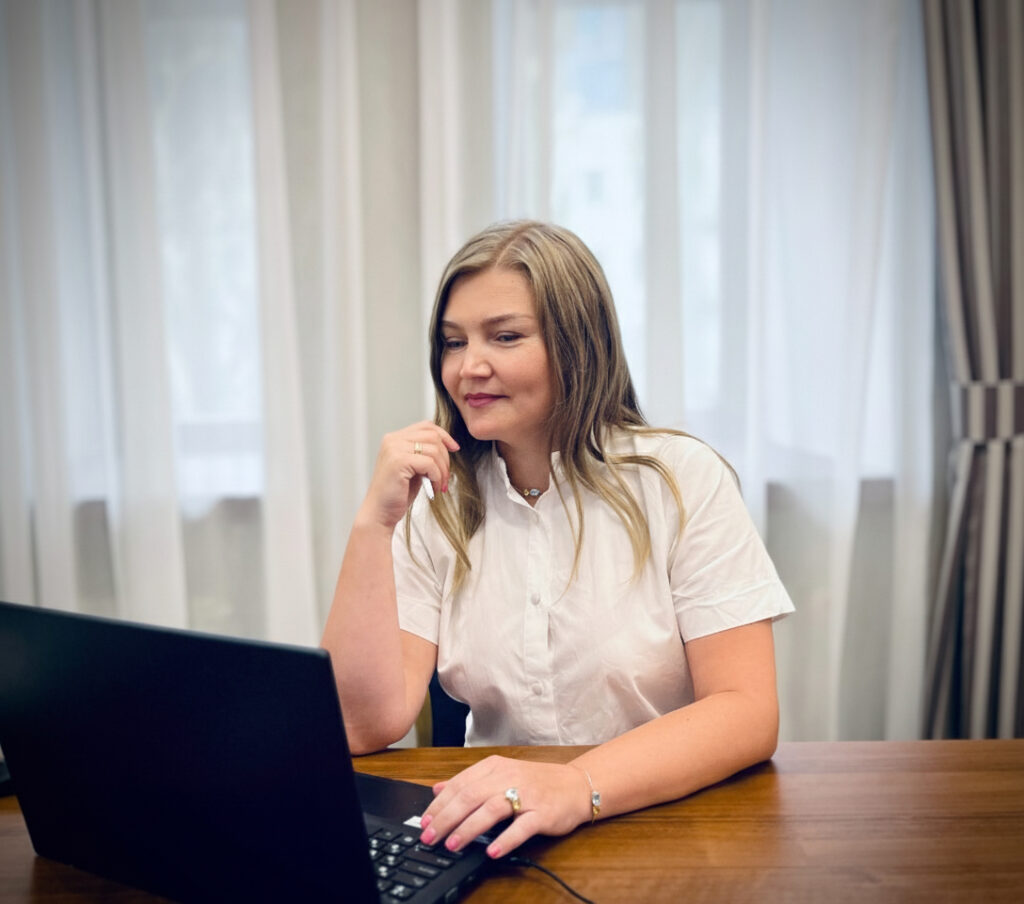
AI as Newsroom Staff: Digital Solutions for Resource-Strapped Media
Operating with skeleton crews under constant threat, Ukrainian frontline newsrooms face a paradox: they need advanced digital tools to maintain professional standards, yet lack the resources to implement them effectively.
Andrii Yurychko, journalist and digital security trainer, identifies this as a sector-wide challenge requiring systematic intervention. “Local Ukrainian newsrooms find themselves at a crossroads,” he observes. “They recognize the impact of new technologies and want to embrace audience engagement strategies, but face significant barriers: lack of skills, specialists, and equipment needed for implementation. There’s also the persistent fear of losing their existing readership.”

Practical AI Implementation
The program’s digital modules focus on immediate, practical applications rather than theoretical frameworks. Tetiana Kaushan of Putyvlski Vedomosti highlights one breakthrough area: “Yurychko’s sessions on artificial intelligence possibilities, particularly in transcribing recordings, greatly simplify our work. This is crucial since we operate with limited human resources.”
For newsrooms operating with two or three staff members, AI transcription services can eliminate hours of manual work—time that can be redirected to verification and reporting.
Tetiana Lohvina of Vesti Zmiyivshchyny confirms the knowledge gap that makes such training essential: “Local media employees cannot always navigate new digital challenges independently, so digitalization sessions are crucial.”
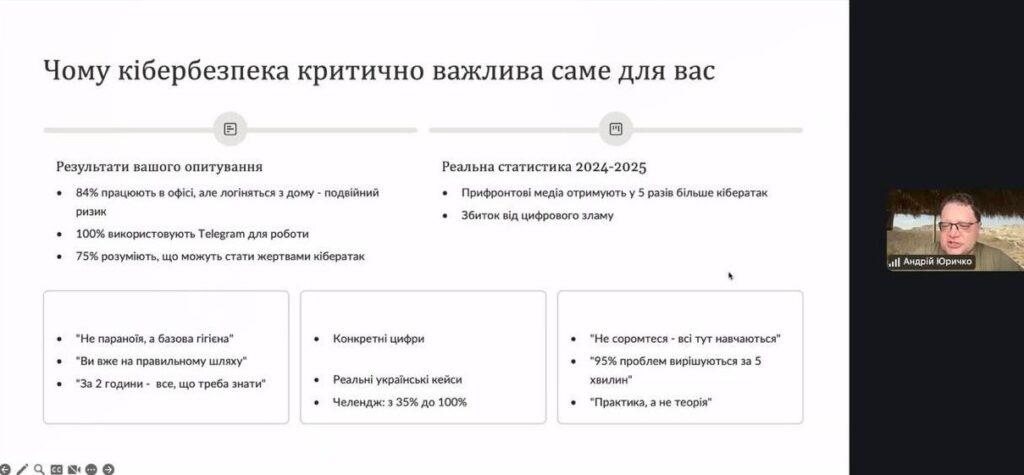
Security vs. Convenience
Surprisingly, digital security emerged as participants’ most urgent concern. Despite awareness of cyber threats, Yurychko notes that few newsrooms implement basic protective measures like antivirus software—a vulnerability that hostile actors actively exploit.
The training addresses this through practical workshops on secure communication tools, data backup systems, and threat recognition. These aren’t theoretical exercises: participants work with browsers like LibreWolf and Brave, set up encrypted communication channels, and develop protocols for protecting sources under surveillance conditions.
Content Optimization and Workflow Efficiency
Beyond security, the program’s large language model workshops demonstrate immediate productivity gains. Participants learn to automate time-consuming tasks: proofreading materials, adapting content for different social media platforms, and generating multiple versions of stories for various audiences.
Olena Kasatkina of Panorama newspaper represents the typical participant response to these tools—recognizing their potential while needing structured training to implement them effectively.
“The program covers the most critical pain points of media work,” Yurychko explains. “Newsrooms are gradually introducing innovations because they not only understood the concepts but tried them practically and see how to apply everything in their specific contexts.”
Community-Centered Approach
This practical focus reflects a fundamental characteristic of frontline journalism that distinguishes it from metrics-driven digital media. For newsrooms that continued operating after 2022, traditional engagement measurements lose relevance.
“Their audience represents much more than numbers—it’s their family,” Yurychko notes. “They work for these communities, and metrics like reach and social media clicks remain abstract concepts compared to the tangible connection they have with the people they serve.”
This community-first approach shapes how digital tools are evaluated: not by traffic generation or revenue optimization, but by their ability to maintain trusted information channels under extreme conditions.
Beyond Local News: Scaling Human Stories for Global Impact
International audiences connect most powerfully with individual human experiences, particularly stories involving children affected by conflict. For Ukrainian frontline journalists, this represents both opportunity and responsibility: each verified account contributes to a broader evidentiary record of systematic civilian targeting.
Yulia Surkova, war correspondent with international media experience since 2014, works with program participants to transform local reporting into globally resonant journalism while maintaining rigorous professional standards.
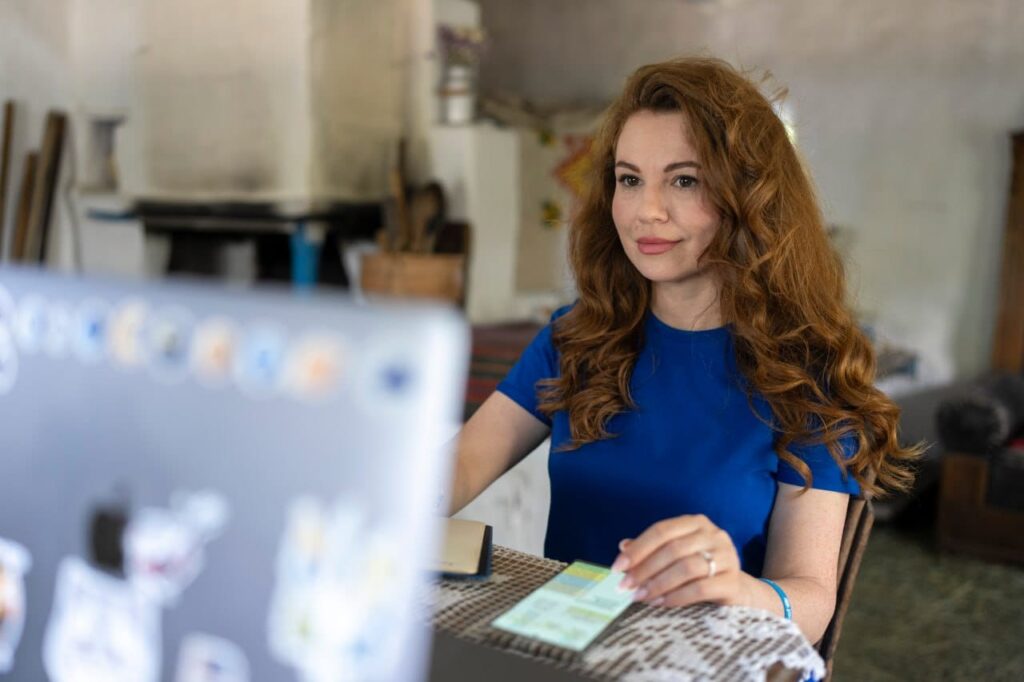
Breaking the “Hyperlocal” Barrier
Traditional community journalism focuses intensively on local events without broader context. Surkova challenges participants to expand this approach: “Don’t be hyperlocal. Add nationwide context, background, and figures to your materials. When you provide such details, the text becomes more professional—and this itself counters false information.”
Svitlana Tomash of Chernihiv’s Visti Horodnianshchyny describes her learning process: “Most journalistic materials in our frontline community involve sensitive content. I had no experience writing for international media. Through Yulia’s mentoring, I’ve learned techniques that will transform my future work.”
The transformation involves technical skills—structuring stories for international readers, providing necessary context, using appropriate sourcing—but also strategic thinking about audience engagement across cultural boundaries.
Dual-Purpose Journalism
This approach serves multiple audiences simultaneously. Anatolii Zhupyna, editor of Kherson region’s Novyi Den, emphasizes how Surkova’s guidance helps identify story angles that resonate both internationally and locally. For Kherson residents in temporarily occupied territories, these publications provide uncensored information about their region.
“Residents who found themselves under occupation can see a real picture of events, not clouded by propaganda,” Zhupyna explains. This dual function—international advocacy and local information service—exemplifies how frontline journalism operates under wartime conditions.
Professional Standards as Information Defense
Surkova’s approach emphasizes rigorous sourcing and contextual reporting as inherently anti-propaganda techniques. “How does propaganda work?” she asks participants. “It blends fragments of truth with lies, all wrapped in emotional manipulation. Our journalism must be the opposite of this.”
The methodology focuses on factual accuracy, verified data, and proper context rather than emotional appeals. “Facts, verified figures, context—these are our weapons against information manipulation,” she explains.
This represents a sophisticated understanding of information warfare: rather than directly confronting false narratives, professional journalism undermines them through superior sourcing and presentation standards.
Recognition Gap
Surkova highlights a persistent imbalance in conflict journalism recognition. “There’s extensive coverage of how national and international journalists work on the front lines, and they rightfully receive awards. However, local media rarely get the spotlight they deserve.”
She continues: “Yet their courage and unwavering commitment to their profession is truly remarkable—it inspires all of us to continue our work.”
This recognition gap has practical implications beyond morale: international funding, training opportunities, and professional development resources typically flow to larger news organizations, leaving frontline community media under-supported despite their crucial role in information verification and community service.
Professional Guidelines: Key Takeaways from NUJU Frontline Media Training
Information Verification and Editorial Integrity
Understanding audience vulnerability:
- Recognize the current information environment of “apathy towards reality”—people experiencing crisis often become desperate and subconsciously seek trustworthy authority figures
- This psychological vulnerability makes rigorous professional standards even more critical, as audiences may accept information based on perceived trustworthiness rather than factual accuracy
Source and expert verification:
- Verify qualifications of all experts, including well-known authorities—reputation does not substitute for credential checking
- Prioritize reliability over publication speed—accuracy builds long-term credibility more effectively than breaking news
- Cross-reference expert claims with documented evidence and alternative sources
Professional standards under pressure:
- Use documented facts, statistics, and verified testimonies rather than emotional slogans
- Avoid hate speech and dehumanizing language even when covering atrocities—do not mirror the tactics you’re reporting on
- Maintain journalistic objectivity as a defense against propaganda techniques that blend truth with emotional manipulation
Technical verification tools:
- Google Reverse Image Search for photo authenticity
- TinEye.com for comprehensive image analysis
- FotoForensics.com for detecting digital manipulation
Human-Centered Storytelling
Child-focused reporting protocols:
- Stories involving children require extended development timelines—never rush to publication
- Secure parental consent and age-appropriate child agreement before proceeding
- Ensure interviews occur in safe, comfortable environments away from immediate danger
- Remember that children’s stories carry significant emotional weight with international audiences and contribute to documentation of systematic civilian targeting
Narrative structure fundamentals:
- Apply the Five Ws principle consistently: Who, What, When, Where, Why
- Integrate statistical data and broader context to elevate local stories beyond community-specific interest
- Maintain genuine engagement with your subjects—authentic investment in their stories translates to reader connection
- Balance emotional impact with factual precision
Digital Security and Workflow Management
Data protection strategies:
- Implement redundant storage systems: cloud services plus physical backups
- Establish separate email ecosystems: primary work account and unlinked backup account
- Prioritize privacy-focused browsers: LibreWolf and Brave offer enhanced protection against tracking
- Digitize archival materials proactively—shell attacks and forced relocations can eliminate physical records permanently
Operational security essentials:
- Install and maintain current antivirus software
- Avoid public Wi-Fi for sensitive work
- Generate unique passwords for each service and rotate regularly
- Enable two-factor authentication across all professional accounts
Information Verification and Analysis
Source credibility assessment:
- Verify expert qualifications independently—expertise claims require fact-checking
- Prioritize accuracy over speed in competitive news environments
- Recognize “apathy towards reality”—audiences seeking trustworthy information sources during crisis periods
Content integrity standards:
- Rely on documented facts, statistics, and verified testimonies rather than emotional rhetoric
- Maintain professional tone even when covering atrocities—avoid dehumanizing language
- Distinguish your reporting from propaganda through rigorous sourcing and contextual presentation
Technical verification tools:
- Google Reverse Image Search for photo verification
- TinEye.com for additional image analysis
- FotoForensics.com for detecting image manipulation
Editorial Philosophy
The training emphasizes that frontline journalism serves dual functions: providing accurate information to local communities while contributing to broader international understanding of conflict impacts. This requires balancing immediate community needs with longer-term documentation responsibilities.
Professional standards become especially critical under wartime conditions, where information manipulation intensifies and audience trust becomes both more valuable and more fragile.


 THE NATIONAL UNION OF
JOURNALISTS OF UKRAINE
THE NATIONAL UNION OF
JOURNALISTS OF UKRAINE
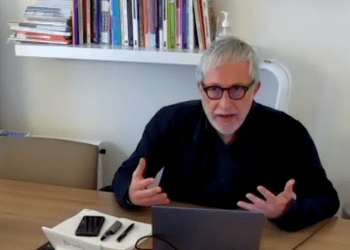
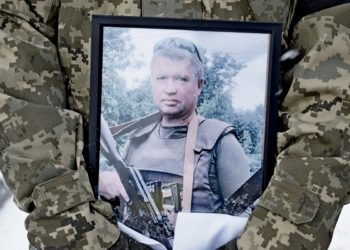
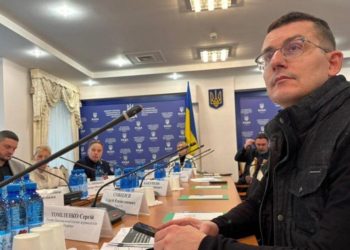













Discussion about this post